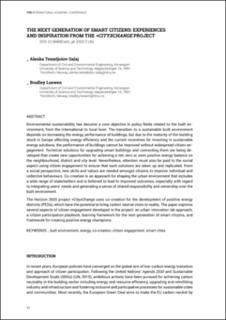| dc.contributor.author | Temeljotov Salaj, Alenka | |
| dc.contributor.author | Loewen, Bradley | |
| dc.date.accessioned | 2021-03-26T09:35:43Z | |
| dc.date.available | 2021-03-26T09:35:43Z | |
| dc.date.created | 2020-12-25T19:17:36Z | |
| dc.date.issued | 2020 | |
| dc.identifier.isbn | 978-86-7924-240-2 | |
| dc.identifier.uri | https://hdl.handle.net/11250/2735670 | |
| dc.description.abstract | Environmental sustainability has become a core objective in policy fields related to the built environment, from the international to local level. The transition to a sustainable built environment depends on increasing the energy performance of buildings, but due to the maturity of the building stock in Europe affecting energy efficiency and the current incentives for investing in sustainable energy solutions, the performance of buildings cannot be improved without widespread citizen engagement. Technical solutions for upgrading smart buildings and connecting them are being developed that create new opportunities for achieving a net-zero or even positive energy balance on the neighbourhood, district and city level. Nevertheless, attention must also be paid to the social aspect using citizen engagement to ensure that such solutions are taken up and replicated. From a social perspective, new skills and values are needed amongst citizens to improve individual and collective behaviours. Co-creation is an approach for shaping the urban environment that includes a wide range of stakeholders and is believed to lead to improved outcomes, especially with regard to integrating users’ needs and generating a sense of shared responsibility and ownership over the built environment. The Horizon 2020 project +CityxChange uses co-creation for the development of positive energy districts (PEDs), which have the potential to bring carbon neutral cities to reality. The paper explores several aspects of citizen engagement developed in the project: an urban innovation lab approach, a citizen participation playbook, learning framework for the next generation of smart citizens, and framework for creating positive energy champions. Keywords: built environment, energy, co-creation, citizen engagement, smart cities | en_US |
| dc.language.iso | eng | en_US |
| dc.publisher | University of Belgrade, Faculty of Architecture Belgrade | en_US |
| dc.relation.ispartof | 7th International academic conference on Places and Technologies | |
| dc.relation.uri | http://doi.fil.bg.ac.rs/pdf/eb_ser/arh_pt/2020/arh_pt-2020-7-ch1.pdf | |
| dc.title | The next generation of smart citizens: Experiences and inspiration from the +CityxChange project | en_US |
| dc.type | Chapter | en_US |
| dc.description.version | publishedVersion | en_US |
| dc.source.pagenumber | 13-22 | en_US |
| dc.identifier.doi | 10.18485/arh_pt.2020.7.ch1 | |
| dc.identifier.cristin | 1863217 | |
| dc.relation.project | EC/H2020/824260 | en_US |
| dc.description.localcode | (c) 2020 by University of Belgrade, Faculty of Architecture Belgrade | en_US |
| cristin.ispublished | true | |
| cristin.fulltext | original | |
